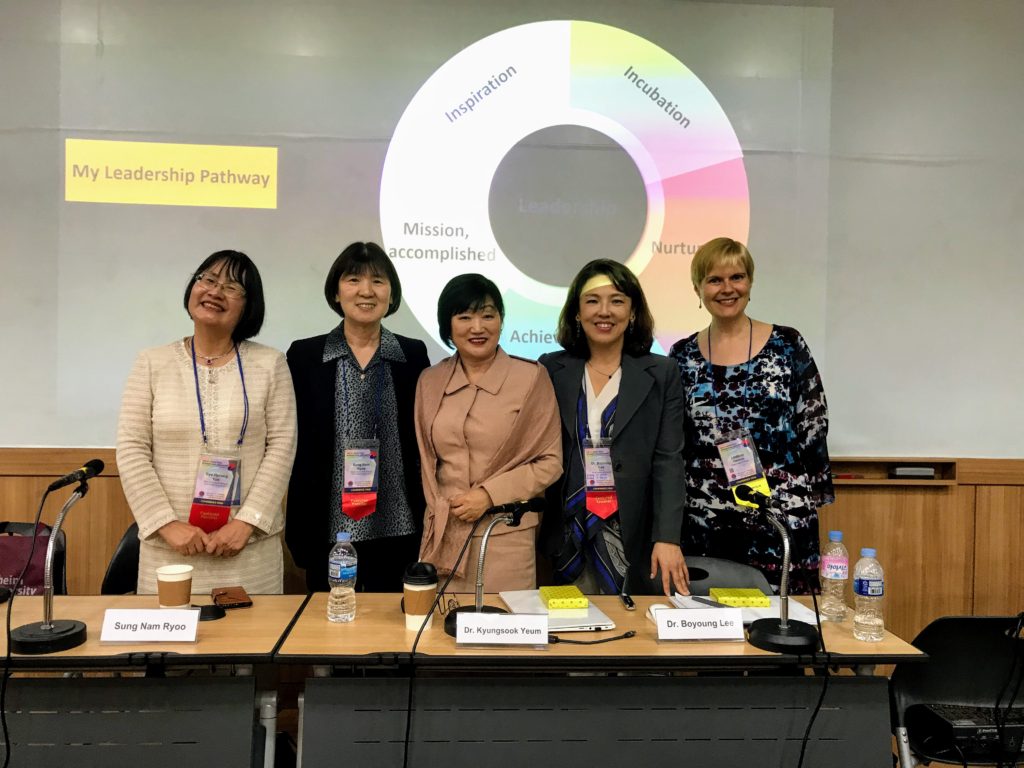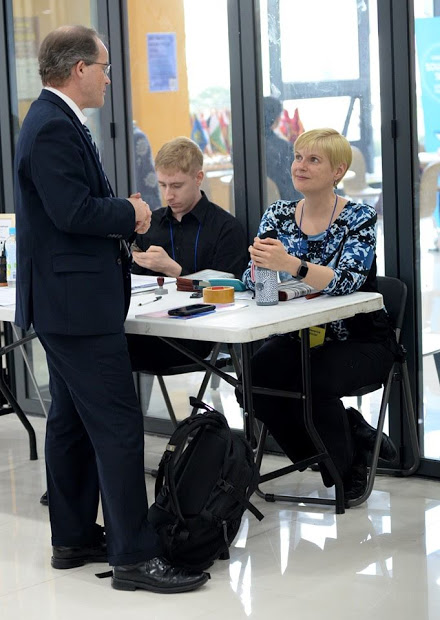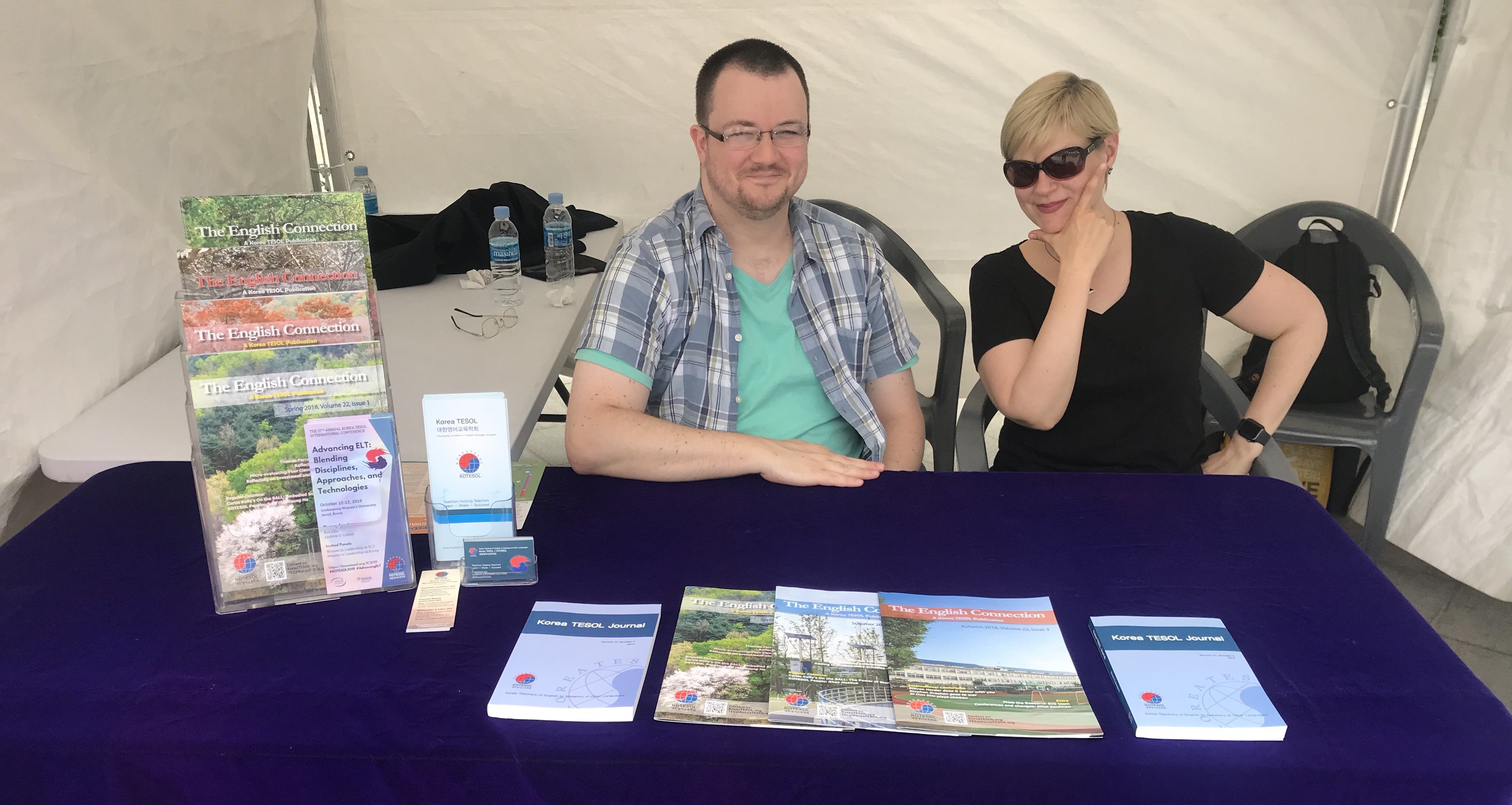Lindsay Herron Leads Korea TESOL Through 2020: An Interview
Interviewed by David Shaffer.
Korea TESOL (KOTESOL; Korea Teachers of English to Speakers of Other Languages) has a new national president, Lindsay Herron, and she is living and working in Gwangju! Last month, Lindsay received Korea TESOL’s highest service award: the President’s Award. I caught up with her recently for this interview for the Gwangju News.
Gwangju News (GN): Thank you for taking time out of your busy schedule for this interview. To begin with, could you tell us a little about yourself and about what keeps you busy these days?
Lindsay Herron: Well, I’m from New Mexico originally, but I attended college in Pennsylvania and lived and worked in New York City before coming to Korea as a Fulbright English teaching assistant (ETA) in 2005. I taught at a boys’ high school in Jeju-do for three years and then in 2008 started at Gwangju National University of Education, and I’ve been here ever since! These days, my time is divided between teaching, volunteering for KOTESOL, and working on a doctorate by distance with Indiana University [USA]. I’ve just completed the coursework for the EdD, in fact; as this goes to print, I’m taking my qualifying exam, and I hope to submit a dissertation proposal by the end of the term.

GN: How did you first get involved in Korea TESOL?
Lindsay Herron: I first heard about KOTESOL while I was teaching in Jeju-do, and as a novice teacher, I was desperately thirsty for professional development. But at the time, the chapter in Jeju was just getting its footing, and their meetings were difficult for me to get to. After I moved to Gwangju, though, I started attending the Gwangju-Jeonnam Chapter meetings on a regular basis and thoroughly enjoyed them.
My involvement got kicked up a notch after the 2012 KOTESOL National Conference in Busan; I decided on a whim to attend the social dinner following the conference, and I discovered the organizers were actually quite approachable, lovely people. Also at that conference, Dr. David Shaffer, who was president of the Gwangju-Jeonnam Chapter at the time, recognized me as a chapter member and invited me to write a review of the conference for KOTESOL’s quarterly magazine, The English Connection. He was evidently satisfied enough with the results to later suggest I consider volunteering for the international conference planning committee – and the rest is history, with Dave supporting and mentoring my ever-increasing involvement every step of the way. I took over as the conference registration director in 2013; Bill Mulligan, another Gwangju-ite, recommended me to replace him as Membership Committee chair; and I soon found myself running for first vice-president under President Peadar Callaghan. I’ve served in some capacity on most of KOTESOL’s committees, and it’s always a pleasure to work with our amazing volunteers while honing my own skills in areas not always directly related to teaching.

GN: What would you say to those who think that they do not need to join KOTESOL because they have been teaching in Korea for a number of years already?
Lindsay Herron: I believe one characteristic of truly outstanding professionals in any field is that they’re never satisfied; they’re always seeking new approaches and challenges, new ways to evolve and grow, and this helps keep them at the top of their game. When you stop seeking growth and are content to rest on your laurels, you stagnate.
Now, for some teachers, teaching is only a small part of who they are; they find opportunities for growth as well as challenges in other areas of their life. I can definitely understand that. But for others among us, professional development is an eternal process – and even after one moves from novice to expert, there are manifold new paths for growth: new opportunities to develop as a mentor, for example, or to contribute to the knowledge ecosystem as a researcher; to advance one’s leadership skills, capitalize on talents currently laying dormant, or build new skillsets. KOTESOL offers opportunities to contribute to our community of practice in new, ever-evolving, personally meaningful ways.
To illustrate: I’ve been teaching for more than fourteen years, but I still benefit from participating in KOTESOL. First, when I attend workshops, I always take away new ideas and inspirations that I can tweak and adapt to my own context. Second, I’m learning how to become a researcher, so I’m fascinated to hear about the various research methodologies and approaches our members are using. I also love flexing skills from my former life in children’s publishing. I spent years planning fetes for authors and award-committee members, coordinating our presence at conferences, and crafting various marketing materials and newsletters; now, more than a decade later, I love being able to revisit and refine these skills for the benefit of KOTESOL. But frankly, even if none of this were true, I’d still participate in KOTESOL; underscoring all the personal and professional benefits I’ve outlined is a foundation of respect and affection for the people involved. KOTESOL is my support network, my community of practice, and my family in Korea.
GN: Membership in KOTESOL is not free. What do members get for their membership fee?
Lindsay Herron: Honestly, I think this is the wrong question. We are a nonprofit organization; first and foremost, what you “get” is the satisfaction of knowing you’re supporting a wonderful cause and helping contribute to English education in Korea.
If that’s not enough, though, I’d point out the many other perks and benefits of membership. Members get immediate digital access to all our publications, including our quarterly magazine and our research journal, and they can receive hard copies upon request. They also receive special invitations to members-only social and networking events, such as our annual wine-and-cheese membership social each October. They can apply for research grants, travel grants, conference grants, and other awards and support. They get a discount to all KOTESOL events that charge a fee, including our national and international conferences, and discounts or other perks from a variety of local, national, and international supporters, including the First Alleyway and Top Bookstore in Gwangju. And of course, it’s an outstanding professional affiliation to include on a resume!
GN: What KOTESOL events are being planned for the coming year?
Lindsay Herron: This coming year is going to be a great one for KOTESOL! Our annual national conference will be held in the spring at the beautiful Kyungnam University in Masan. We’re co-hosting the 2020 Asia TEFL Conference, which will be held June 25–27 in Goyang and which should afford some unique opportunities for KOTESOL members. And of course, our international conference, which is held each October and is the largest annual ELT conference in Korea, promises to be a stellar event!
GN: It sounds like another great year! Thank you, Lindsay, for the wealth of information that you have provided in this interview, and best of luck to you in your year as KOTESOL president.
Lindsay Herron: Thank you very much!
The Interviewer
David Shaffer just completed his term as national president of KOTESOL. He has lived for many years in Gwangju and taught for many years at Chosun University. Dr. Shaffer has been associated with KOTESOL since its beginnings. As vice-president of the Gwangju-Jeonnam Chapter of KOTESOL, he invites you to participate in the teacher development workshops at their monthly meetings. Dr. Shaffer is presently the chairman of the board at the Gwangju International Center and also editor-in-chief of the Gwangju News.




